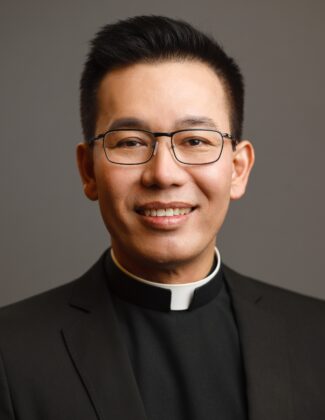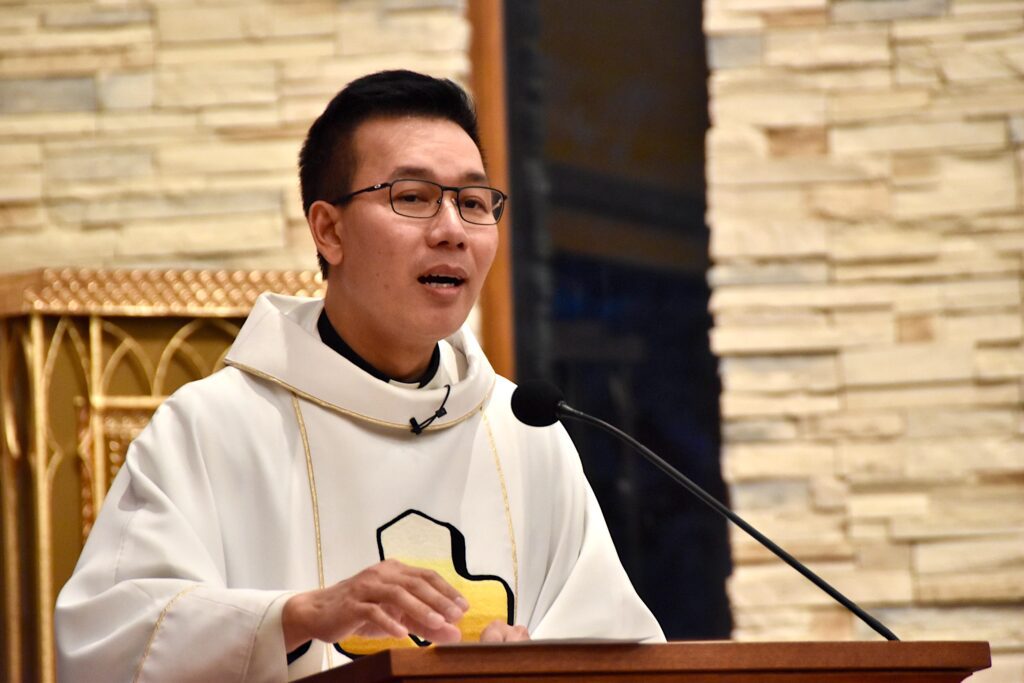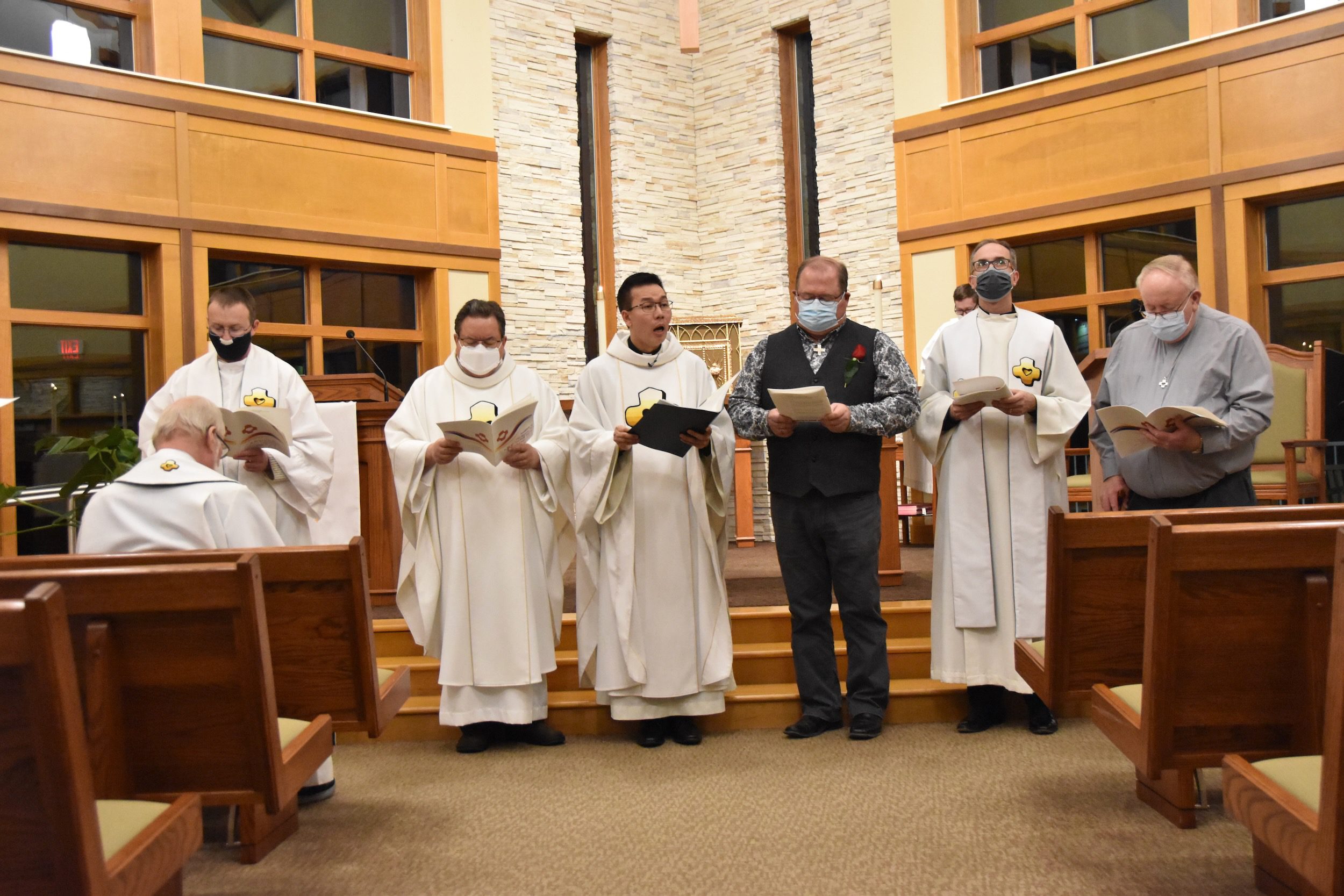On Wednesday, February 2, Fr. Vien Nguyen, SCJ, was installed as the 16th provincial superior of the US Province of the Priests of the Sacred Heart (Dehonians). He was elected to the position by fellow SCJ priests and brothers on January 4 during the province’s Election Assembly.

Originally from Vietnam, Fr. Vien, 48, immigrated to the United States when he was 16. His family is now based in Houston. Several came to Good Shepherd Chapel at Sacred Heart at Monastery Lake (Franklin, WI) to be present for his installation.
Prior to his election, Fr. Vien was vice rector and assistant professor of Scripture Studies at Sacred Heart Seminary and School of Theology in Hales Corners, WI. Seminarians for the archdiocese of Milwaukee do their academic studies at Sacred Heart.
Fr. Vien professed his first vows as a religious in 1997, and was ordained to the priesthood in 2004. He has an M.Div. from Catholic Theological Union in Chicago, and an Th.M, S.T.L, and S.T.D. from the Jesuit School of Theology in Berkeley, CA.
His first assignments were in parish ministry in Houston, first at Our Lady of Guadalupe (2004-05) and at St. Elizabeth Ann Seton (2005-07). He then spent five years as a member of the province formation team, working with young men studying for religious life and the priesthood.
Fr. Vien has been on the faculty of SHSST since 2018. He has been published in a wide variety of theological and professional publications, including the Review of Biblical Literature, Journal of Biblical Theology, and The American Journal of Biblical Theology.
Also elected during the January assembly were members of the Provincial Council: Fr. Jack Kurps, SCJ (executive director of Sacred Heart Southern Missions in Mississippi), Fr. Rafael Querobin, SCJ (administrator of Our Lady of Guadalupe parish in Houston), Fr. Greg Schill, SCJ (chaplain at St. Joseph’s Indian School in South Dakota), Br. Duane Lemke, SCJ (superior of Sacred Heart Monastery and province director of Justice, Peace and Reconciliation) and Dn. David Nagel, SCJ (treasurer of the US Province).
The new administration begins a three-year term.
CLICK HERE for PHOTOS from the installation
HOMILY: Click here to download a PDF of Fr. Vien’s homily or read it below:

Feast of the Presentation of the Lord
Homily by Vien V. Nguyen, SCJ
Two days after my election to provincial leadership, I called my mom and told her the news. She congratulated and offered me her prayers. When I told her about my responsibilities as provincial superior, there was silence on the phone. She then asked, “Why didn’t you say no?”
Why didn’t you say no? I had no answers for her. For the next few days, the question kept lingering in my mind. The more I thought about the question, the more I was led to the two biblical figures: Moses and Jeremiah. Moses knew full well the challenges of the mission. When God called him, Moses was reluctant to accept the commission by voicing his objections: I am a terrible speaker; I don’t have all the answers; People won’t take me seriously; I am not qualified. He even begged the Lord to send someone else. Jeremiah also feared his call and objected to it by mentioning his youth and inexperience. In his response to God, he said: “Ah, Lord God! I do not know how to speak. I am too young!” (Jer 1:17).
Why didn’t you say no? To answer this question, I needed to find out why Moses and Jeremiah didn’t say no to the call. I discovered that they had come to recognize that God was committed to them. Despite Moses’ many excuses, God never backed down. Jeremiah was told that God called him even when he was in the womb. Moses and Jeremiah couldn’t say no because they got a taste of God’s mysterious love. They fell in love, and they devoted their lives fully to God.
When people are in love, they are willing to do whatever is asked of them for the beloved. In our Dehonian terminology, it means availability. Moses and Jeremiah responded with love and became messengers of the covenant. Their role was to direct the heart and mind of the people to God. This is the point of today’s first reading from the prophet Malachi. The unnamed messenger would prepare the people for the coming of the Lord. For Malachi, whose name means “my messenger,” the coming of the Lord would be a time of purification and covenant renewal. And to prepare for God’s coming, Malachi called the people to proper worship and social justice.
When people are in love, they are faithful to each other in good times and in bad. Listen to Jeremiah’s confession after accusing God of deceiving him: I said I will not mention him, I will no longer speak in his name. But then it was as if fire were burning in my heart, imprisoned in my bones; I grew weary holding back, I could not! (Jer 20:9). God had taken over his life. The only choice for Jeremiah was to respond faithfully to God.
The theme of faithfulness is highlighted in today’s Gospel reading. Mary and Joseph were a typical pious Jewish couple who went to the temple to offer sacrifice as required and expected of them by Mosaic Law concerning the purification of birth mothers and offerings for the firstborn. Simeon and Anna were faithful Jews who went to the temple every day to await the advent of the Messiah, the light of the nations. They trusted in God’s promise and did not lose hope. And God was faithful to God’s promise. At the temple, Simeon and Anna were rewarded for their faithfulness and perseverance. They held in their arms the Savior of the World.
Why didn’t you say no? A better question: why didn’t WE say no? It is because like Moses and Jeremiah, we are in love. This love begins with God. Despite our flaws and imperfections, God loves us and works with our limitations and defects to draw us to himself and create something new for God’s kingdom. With God, our weakness becomes strength (2 Cor 12:9).
Most of us are familiar with the Christmas song “Rudolph the Red-Nosed Reindeer.” Rudolph is born with a defect. While other reindeer only see his imperfection, Santa sees his potential. Rudolph’s shiny red nose becomes Santa’s solution to a foggy Christmas Eve. The story of Rudolph’s redemption resonates with biblical redemption. God uses us with our brokenness. God redeems us and invites us to be a part of his mission of redemption. And God equips us for mission. Someone said it well that “with God’s calling comes God’s gifting.” When Moses and Jeremiah said that they were not worthy, God reminded them that God would take care of their inadequacies. God told both of them not to be afraid and that God would be with them–always. In his homily addressing consecrated men and women on this Feast last year, Pope Francis said that God does not demand perfection but heartfelt enthusiasm and—I add—the openness to hear and respond to the Spirit.
Why didn’t you say no? I didn’t have an answer for my mom then. But I do now. Like Moses and Jeremiah, like many generations of SCJs, and like you, I am in love with God. There is only one thing left for you and me to do: Surrender! Or as Fr Dehon would say, “Fiat.” This suscipe or prayer of St. Ignatius of Loyola captures the essence of surrendering everything to God:
“Take, Lord, and receive all my liberty, my memory, my understanding, and my entire will. All I have and call my own. You have given all to me. To you, Lord, I return it. Everything is yours: do with it what you will. Give me only your love and your grace. That is enough for me.”
Like Jesus, our response is one of ecce venio (“Behold, I come to do your will;” Heb 10:7). Like Mother Mary, our response is one of ecce ancilla (“Behold, I am the handmaid of the Lord. May it be done to me according to your word;” Lk 1:38).
On this Feast of the Presentation of the Lord, may we, by the grace of God, be presented to the Lord as willing and faithful servants who are in love with God.
Click on the image below to view a video summary of the January 3-6 Province Election Assembly:

